|
Private universities to be a top forex earner:
Sri Lanka can be a regional education hub
By Shirajiv SIRIMANE
|
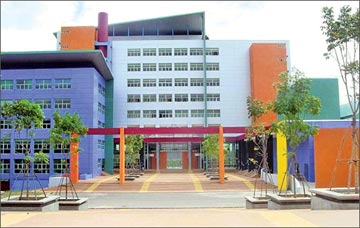
Sri Lanka Institute of Information Technology. (SLIIT)
|

Minister of Higher Education S. B. Dissanayake |
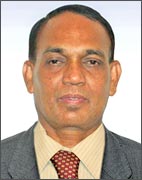
UGC Chairman, Prof. Gamini Samaranayake |

Michael Ranasinghe, Director, Synergy School of Marketing |
Sri Lanka boasts of one of the highest literacy rates (92%) in Asia
and also ranks the best in South Asia. Education would play a vital role
towards making Sri Lanka the “Wonder of Asia” as the country can easily
be transformed in to a regional education hub.
Exploiting the unique education track record Sri Lanka possesses,
foreign students too could be promoted to have their higher education in
Sri Lanka bringing in foreign exchange to the country. This would also
entice foreign education institutes to invest in Sri Lanka through the
Board of Investment opening new vistas of higher education bringing
numerous benefits to Sri Lankan students as well.
Education in Sri Lanka has a long history dating back to 300 BC and
the Western touch was introduced during the British period. The
Constitution of Sri Lanka provides for education as a fundamental right.
The University of Ceylon was established by the State Council in
April 1942. The nucleus of the University was formed by amalgamating the
Ceylon Medical College founded in 1870 and the Ceylon University College
founded in 1921, both of which were incorporated into the University.
Therefore, the history of the university goes back to the nineteenth and
early twentieth centuries.
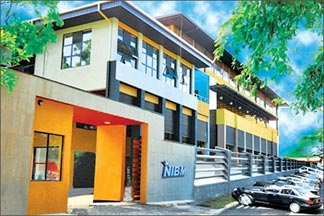 During that time, the University had ample slots and today the 15
government Universities and the three campuses can meet the demand of
only 20,000 students out of 100,000 that qualify to enter the university
each year. During that time, the University had ample slots and today the 15
government Universities and the three campuses can meet the demand of
only 20,000 students out of 100,000 that qualify to enter the university
each year.
It is a very sad scenario that 100,000 qualified students are shown
the door by the government universities. The affluent students take the
aerial route to either UK, Australia, Russia, USA or some other
countries for higher education while others join universities in India,
Bangladesh, Singapore, Malaysia or Cyprus.
Each year over 15,000 students seek higher foreign education draining
billions of Sri Lankan funds to these countries. A degree program in UK
would cost a Sri Lankan student over Rs. 6 million while an engineering
degree would cost in excess of Rs. 8 million. The investment to obtain a
medical degree would be over Rs. 18 million. In addition, this also
creates numerous social problems for both students as well as parents.
No student loan scheme
Parents on their part mortgage their, property and live a torrid life
while students overseas sometimes stoop to many vices to meet their
financial ends.
The new Minister of Higher Education, S. B. Dissanayake is looking at
broadbasing the higher education system giving more opportunities for
the private sector. He said while developing the present Universities
more universities are the need of the hour and the private sector can
assist in this regard. “This would also create more opportunities for
students to study within Sri Lanka saving foreign exchange and it would
also see foreign students coming over to Sri Lanka,” he said.
Michael Ranasinghe, Director and Senior Lecturer, Synergy School of
Marketing also endorsed this view.
“I am glad that the new Minister of Higher Education is thinking out
of the box and this is where we as a nation should be heading. We have
come a long way and our generation has seen the worst times this country
has been through. Now if we do not make a new start with renewed vigour
we are once again losing an opportunity of a lifetime. An innovative and
progressive education system prevents social dissent.”
“We have been in the professional education sector for over a decade
and have seen the transformation of the industry in both positive and
negative directions. I have been lecturing for over 12 years and having
commenced my career in a Japanese Fortune 500 company, I am well aware
of the gaps that do exist between the education system and the
expectations of the corporate world both local and international.”
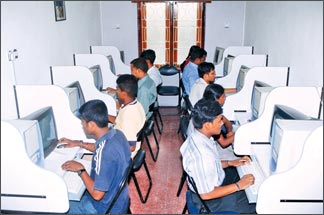 “One thing that goes without saying is the fact that the education
sector must evolve with the trends in the business environment. When I
say business environment I mean in every sector,” he explained. “One thing that goes without saying is the fact that the education
sector must evolve with the trends in the business environment. When I
say business environment I mean in every sector,” he explained.
“The medical profession for instance has to evolve with the trends in
that sector. Private universities, international qualifications in a way
put pressure on our local education sector to change with the
requirements of the employers.”
“Take for instance CIMA, ACCA and CIM which are the much sought after
professional qualifications by students as corporate sector has accepted
these qualifications as the standard when recruiting candidates. The
high quality of these qualifications has helped the local qualifications
to step up their standards and make them aspire to by the students and
the corporate sector.”
“This being said we cannot ignore the fact that a critical analysis
should be done to our local curriculum. For this we need the infusion of
ideas from the private sector and also have a few selected overseas
countries against which we can benchmark our local curriculum. I do not
mean western countries.”
“Take Malaysia and Singapore for instance. What should be designed is
a hybrid that suits the local as well as international requirements. A
student who has completed his education locally should be as competitive
as his counterpart who has chosen the international qualifications in
Sri Lanka.
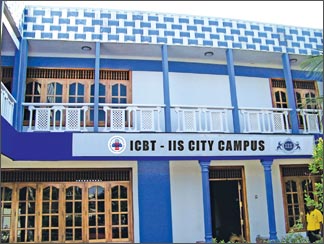 Privately delivered qualifications are good as long as they conform
to the standards expected and not resort to short-term financial gains
by adopting unethical practices. The government should have an effective
mechanism to monitor this and those involved in education should be
conscious that they owe it to the students and society to produce men
and women of stature.” Privately delivered qualifications are good as long as they conform
to the standards expected and not resort to short-term financial gains
by adopting unethical practices. The government should have an effective
mechanism to monitor this and those involved in education should be
conscious that they owe it to the students and society to produce men
and women of stature.”
Meanwhile, UGC Chairman, Prof. Gamini Samaranayake said that reputed
world Universities listed in Commonwealth Year Book and International
Handbook should be asked to invest in Sri Lanka so that they could also
entice foreign students.
“What we want to do is to improve the quality of local university
education so that they would be in a better position to meet the demand
of the future world,” he added.
An educated workforce is an asset to any country and many say that
the time is right to set up private universities to produce more job
oriented graduates to make Sri Lanka the Wonder of Asia.
‘No loan scheme for higher education students’
|

Mohan Pathirana
top ICBT campus in Jaffna
|
Veteran Education administrator of Sri Lanka’s largest private
education institute, International College of Business and Technology,
popularly known as ICBT Campus, Mohan Pathirana CEO/Executive Director,
says that it’s ironic that the country’s banking sector does not have a
special student higher education loan scheme. “If a student is to take a
loan he or she has to offer the same collateral and is given the same
high interest that is given to other creditors,” he said. “This is very
sad.”
Pathirana said that in other countries there are schemes where
students could sign a bond and pay the loan once he completes his
education,” he said.
With the dawn of peace there would more competition to gain
university entrance as more students would sit the GCE A/L exam. He said
that it is to meet this demand they set up ICBT IIS campus in Jaffna.
“ICBT provided courses from Diploma to Doctorate level for almost a
decade in Sri Lanka. It expands from North to South, Western and Central
regions in the country and has affiliations with many foreign
Universities and Educational Service Providers. We also see a very good
student response for our Jaffna branch,” he said.
“The mission of ICBT campus is to collaborate with internationally
reputed Universities and Educational Institutions in order to provide
high quality educational programs, which will enhance the quality of the
human resources available to the job markets at an affordable level, and
thereby contributing to the development of the economy and society,” he
said.
Pathirana says that the Sri Lankan universities should also produce
more graduates with practical knowledge and they should have better
leadership qualities and they should also be job oriented. “Today in the
private sector there is no position called trainee as the mercantile
sector aspires for more dynamic recruits,” he said. Due to this the ICBT
which celebrates their tenth year, makes it compulsory for students to
present their own CSR project before they pass out.
Due to the quality of their education they have many foreign students
bringing foreign exchange to the country. “Similarly we also have our
operation in Dubai and Oman”.
He said that the private sector should be given bigger openings in to
the higher education sector but cautioned that there should be a proper
monitoring and regulatory system.
ICBT Campus is regularly monitored and regulated by the respective
foreign universities and Edexcel International and neutral quality
assuring agencies for the quality while ICBT Campus is one of the very
few institutes in Sri Lanka with ISO 9000:2001.
ICBT Campus has over 20,000 passed out students and over 7000 current
students in their programs from diploma level to doctoral level in the
areas of Management, Information Technology, Engineering, Languages,
Quantity Surveying.
He also suggested that the government must re-think over imposing of
VAT and other taxes on the private sector education as they are forced
to take it from the students, thereby raising the course fees.
No opposition from varsity students
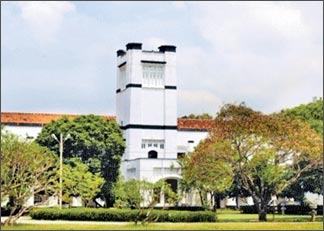
Colombo University |
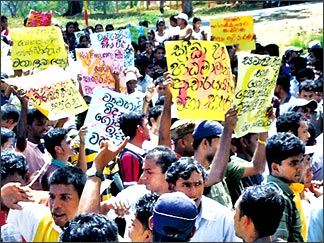
A protest, a very common occurrence at State universities |
A Colombo University student R.C. Jayasekera
said that they are not opposing more students gaining university degrees
through a private institution. “However what we say is that quality
should be guaranteed,” he said.
Citing an example he said that today one
could get a doctorate by attending a few online classes and there are
private education schools that pass students irrespective of his or her
preferment at the examination. “It is a burden to teach the failed
student again and hence they pass the student,” he said.
The student’s union member also said that
even in a small country like Maldives an education seminar cannot be
held without the written approval of the government’s education
accredited Board and in countries like UK over 100 private courses were
banned as they were not upto the standard. “Even in India there is a
Education Council that monitors the private sector educational
institutes but sadly in Sri Lanka one could get BoI approval and start
an education institute,” he said.
“The government has set up many higher
education institutes like the NIBM and Sri Lanka Institute of
Information Technology. (SLIIT) and more similar ones should be set up,”
he added.
The NIBM has been authorized to award the
BSc in Business Management, Human Resource Management, Logistics,
Project Management and Industrial Management and the BSc in Management
Information Systems degrees.
Sri Lanka Institute of Information
Technology (SLIIT) is the largest IT degree awarding institute in Sri
Lanka in the field of Information Technology, recognised by the
University Grants Commission under the Universities Act. The SLIIT was
established in 1999 to educate and train IT professionals required by
the fast growing IT industry in Sri Lanka. |

